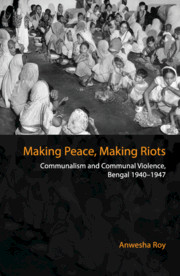Book contents
- Frontmatter
- Frontmatter
- Contents
- Maps and Figures
- Acknowledgements
- Abbreviations
- Glossary
- Introduction
- 1 The Dacca Riot, 1941
- 2 Famine 1943 – Towards a Hardening of Community Identities
- 3 From Community to Communal: The Bengal Secondary Education Bill and the Idea of Pakistan
- 4 The Great Calcutta Killing, August 1946
- 5 Noakhali Riots, October 1946
- 6 A Test of Faith: Gandhi in Noakhali and Calcutta 1946–47
- Concluding Remarks
- Appendix 1
- Appendix 2
- Appendix 3
- Appendix 4
- Bibliography
- Index
3 - From Community to Communal: The Bengal Secondary Education Bill and the Idea of Pakistan
Published online by Cambridge University Press: 23 October 2018
- Frontmatter
- Frontmatter
- Contents
- Maps and Figures
- Acknowledgements
- Abbreviations
- Glossary
- Introduction
- 1 The Dacca Riot, 1941
- 2 Famine 1943 – Towards a Hardening of Community Identities
- 3 From Community to Communal: The Bengal Secondary Education Bill and the Idea of Pakistan
- 4 The Great Calcutta Killing, August 1946
- 5 Noakhali Riots, October 1946
- 6 A Test of Faith: Gandhi in Noakhali and Calcutta 1946–47
- Concluding Remarks
- Appendix 1
- Appendix 2
- Appendix 3
- Appendix 4
- Bibliography
- Index
Summary
In culture, custom, faith, race and attire,
Thou diff ‘rest from them like black and white,
And there lie differences grave and dire,
Even in thy daily drink and dite.
The worshippers of streams and rivers that flow,
And of things in which awe or gain they see,
‘Malechha’ or meanest men of clan low,
Indeed these learned Pundits term thee.
Their dishonest hearts now lie quite bare,
For by their objection to Pakistan,
They verily deny the rightful share,
Of hundred millions of Mussalmans.
Like a limb from its body away,
Thou lyest motionless in the foe's camp,
It is high time for thy real part to play,
Come, light thy heart with Muslim League's lamp.
Excerpts from a poem published in The Star of India on 22 January 1946CASTE AND COMMUNITY POLITICS AROUND THE ISSUE OF SECONDARY EDUCATION
We have seen in the previous chapter how famine relief was used as a window for communal mobilizations. Bengal was still reeling under the impact of the famine, when a new political issue captured its imagination. This was the tabling of the Secondary Education Bill by the ruling party in the Bengal Legislative Assembly, which immediately intensified the communal divide.
The Secondary Education Bill (henceforth referred to as SEB) was tabled by the Education Minister Tamizuddin Khan on the floor of the Bengal Legislative Assembly on 24 April 1944. Its objective was the ‘regulation, control and development of secondary education in Bengal.’ According to the education minister, secondary education in Bengal was in dire need of reform, yet, no other attempt at reform ‘had met with greater opposition from certain particular bodies and certain particular sections of people.’ The proposed Secondary Education Board was to consist of fifty-three members. The elected members of the board were to be returned by separate electorates of Hindus, Muslims and Scheduled Castes (hereafter referred to as SC). Scheduled Castes would have five representatives, to be elected through separate electorates, including the Special Officer for Scheduled Caste Education (who may or may not be a SC). It was primarily the insistence on separate electorates that resulted in outrage among the largely Caste Hindu opposition comprising the Congress and the Hindu Mahasabha.
- Type
- Chapter
- Information
- Making Peace, Making RiotsCommunalism and Communal Violence, Bengal 1940–1947, pp. 104 - 147Publisher: Cambridge University PressPrint publication year: 2018



